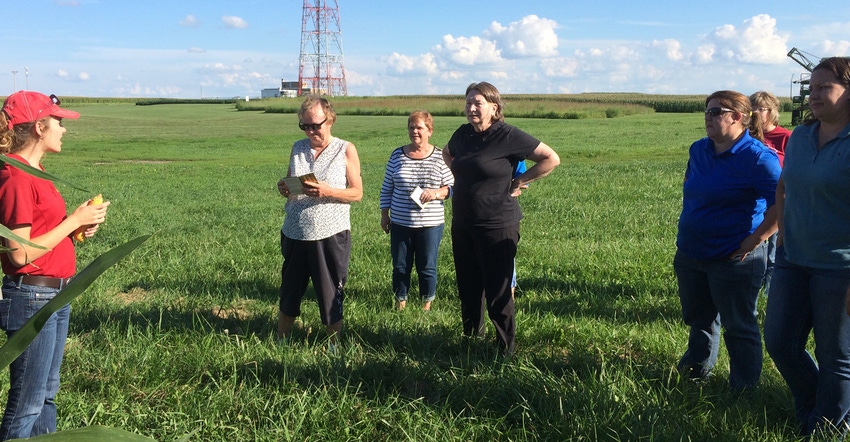December 24, 2019

This fall, I had the opportunity to speak at the Iowa State University Foundation Professional Advisors conference about working with women landowners to implement a successful farm estate and succession plan. There are many unique aspects of working with and advising women landowners.
We’ve all heard there is an increasing amount of land in Iowa owned by people over the age of 65 years old, and there has been an increase in out-of-state landowners and an increase in cash rental of farmland. On average women outlive men in the U.S. by about five years, according to recent data. So, it stands to reason that the amount of farmland held by women will increase over time.
Here are some statistics specific to ownership of land by women:
In 2017, women owned about 49% of farmland in Iowa, while men owned 51%. That number has stayed fairly steady in recent years.
Distribution of Iowa farmland by age and gender shows women over the age of 80 own 14% of the farmland, compared to 8% owned by men over 80.
For more information on farmland ownership in Iowa, read the report Iowa Farmland Ownership and Tenure Survey 1982-2017: A Thirty-Five Year Perspective, published in 2018 by the ISU Center for Agricultural and Rural Development.
Working with landowners
What does this mean for farming in Iowa and our farm operations? What I’ve learned working with landowners, both women and men, is that each person involved in the farming operation offers a unique and different perspective. Every operation is different. Every family is different. The plan truly depends on the operation.
Women are involved in a variety of ways on Iowa’s farms. I’ve met women who are actively involved in the farm operation from operating equipment to managing the business. I’ve also worked with women who may be retired but want to find a successor or farmer to actively farm the land and continue a family legacy. Whether it be mother, daughter-in-law, widow, full-time farmer or beginning farmer, women in farming are a diverse group.
From a long-range planning standpoint, my observation is that women often play a critical role in starting the conversation and bringing that conversation, goal-setting and work along the way to fruition.
ISU offers a program called Annie’s Project that focuses on educating farm women on a variety of topics, including estate planning, business planning, marketing strategies, retirement and financial topics. I’ve had the opportunity to be involved in this program periodically over the years and have found the information presented to be extremely valuable. For more info, visit aep.iastate.edu/womeninag.
2020 Iowa Legislative session
Several readers of this column have asked what the Iowa Legislature is focusing on this session and priorities set forth by elected officials and groups supporting agriculture.
The Legislature begins its 2020 session in the second year of the 88th Iowa General Assembly on Jan. 13. Several issues appear to be on the forefront. Of course, protecting and improving water quality (and how to further fund water quality programs and related efforts) remains a priority for Iowa’s ag leaders. There have been several proposals discussed for additional funding sources, and we will monitor that issue closely.
Other issues on the forefront appear to be beginning farmer programs, tax relief, livestock regulation, and research funding for animal disease outbreak prevention.
Legislative priorities
According to commodity groups, such as the Iowa Corn Growers, funding for efforts to expand the use of renewable fuels, specifically for renewable infrastructure cost-share programs, is something they will be lobbying for.
Some groups will be supporting a proposed increase in the Iowa sales tax, with part of the money raised to be used for funding cost-share programs for water quality protection practices. For example, the funds could increase the amount of cost-share funding available as an incentive to get more farmers and landowners to use cover crops and install edge-of-field practices such as saturated buffers and bioreactors.
Iowa farm and commodity groups will push hard to at least maintain legislative funding levels for water quality efforts across the state in accordance with the Iowa Nutrient Reduction Strategy. Livestock groups will most likely be focusing on existing regulatory framework for their industry, working together on these priorities.
This year’s timeline
To keep on pace to finish the session in 100 days, the Legislature sets two self-imposed “funnel” deadlines. According to the 2020 Iowa legislative timetable, the first is Feb. 21 and the second is March 20. In short, any bill that is introduced that doesn’t pass in its committee of origin prior to the first funnel deadline is deemed “dead” and does not progress, thus limiting the number of bills the Legislature has to deal with in the session.
It’s important to note that appropriations, ways and means, and oversight bills aren’t subject to the funnel deadlines. Policy bills that contain spending or taxing provisions that passed the policy committees then move on to the appropriation, or ways and means committee for review. The 2020 session is set to end on April 21; however, in past years it has run longer than expected.
In upcoming months in this column, we will continue to provide updates on bills introduced in the session and their status. What impact will legislative decisions have on family farmers and agriculture this session? Stay tuned for developments and answers to those and other reader questions. For more information on legislative activities, visit legis.iowa.gov.
Herbold-Swalwell is an attorney with Brick-Gentry in Des Moines. Contact [email protected].
About the Author(s)
You May Also Like






